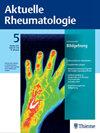Evaluation Of The Relationship Of Kinesiophobia With Anxiety, Upper Extremity Disability And Quality Of Life In Patients With Frozen Shoulders
IF 0.2
4区 医学
Q4 RHEUMATOLOGY
引用次数: 0
Abstract
Abstract Introduction Frozen shoulder is a painful shoulder disease in which glenohumeral joint movements are actively and passively restricted in all directions. If not treated, it can cause various psychological diseases and muscle and joint diseases. Kinesiophobia; this is defined as a fear of physical activity resulting from excessive sensitivity and an uncomfortable feeling due to painful or repeated injury. In this study, it was aimed to evaluate the relationship of kinesiophobia to upper extremity disability, anxiety and quality of life in patients with frozen shoulder. Materials and methods Fırat University Faculty of Medicine, Department of Physical Medicine and Rehabilitation, between September 2020 and March 2021; As a result of clinical evaluation and radiological examinations, patients were enrolled between the ages of 18–75 and who agreed to participate in the study; 48 patients were diagnosed with frozen shoulder and met the inclusion and exclusion criteria of the study and were included in the patient group; Fourty healthy subjects aged between 18–75 years, who did not have shoulder disease and who met the inclusion and exclusion criteria of the study, were included in the control group. A total of 88 cases were included in the study. The following scales were used. TAMPA kinesiophobia scale to assess kinesiophobia in patients and control group, Beck Anxiety scale to assess anxiety in patient group; The Disabilities of The Arm, Shoulder and Hand (DASH) scale to assess upper extremity disability; Short Form (SF)-36 was used to assess quality of life. Results TAMPA kinesiophobia scale was found to be significantly different in the patient group when the patient group and control group were compared. According to the correlation analysis, the TAMPA kinesiophobia scale showed a positive correlation with the Beck-Anxiety and DASH scales in the patient group, while a negative correlation was found with the SF36-Physical function, emotional role difficulty and social functionality. Conclusion In patients with frozen shoulder, kinesiophobia seems to be associated with increased anxiety and upper extremity disability, as well as low quality of life. Structural disorders as well as psychological factors should be taken into account among the reasons for the prolonged limitation of movement and delayed recovery. When the physicians serving in the primary care are experienced with patient management with frozen shoulder, as evaluated for therapeutic purposes, planning psychological support treatments in addition to medical and physical therapy will increase the quality of health care provided to patients.肩周炎患者运动恐惧症与焦虑、上肢残疾和生活质量的关系评价
摘要简介肩周炎是肩关节活动受到主动和被动全方位限制的一种疼痛性肩周炎。如不及时治疗,可引起各种心理疾病和肌肉、关节疾病。Kinesiophobia;这被定义为由于过度敏感和由于疼痛或反复受伤而产生的不舒服的感觉而对身体活动的恐惧。在本研究中,目的是评估运动恐惧症与冻结肩患者上肢残疾、焦虑和生活质量的关系。材料与方法Fırat大学医学院物理医学与康复系,2020年9月至2021年3月;根据临床评估和放射学检查结果,年龄在18-75岁之间并同意参加研究的患者被纳入研究;48例诊断为肩周炎且符合本研究纳入和排除标准的患者纳入患者组;40名年龄在18-75岁之间、没有肩部疾病且符合研究纳入和排除标准的健康受试者被纳入对照组。研究共纳入88例病例。使用了以下量表:坦帕运动恐惧症量表用于评估患者和对照组的运动恐惧症,贝克焦虑量表用于评估患者组的焦虑;臂肩手残疾量表(DASH)评价上肢残疾使用SF -36评估生活质量。结果将患者组与对照组进行比较,发现患者组的坦帕运动恐惧症量表存在显著差异。相关性分析显示,坦帕运动恐惧症量表与患者组Beck-Anxiety、DASH量表呈正相关,与SF36-Physical function、emotional role difficulty、social function呈负相关。结论在肩周炎患者中,运动恐惧症似乎与焦虑增加、上肢残疾以及生活质量低下有关。结构障碍和心理因素应考虑到长期限制运动和延迟恢复的原因。如果在初级保健服务的医生在管理肩周炎患者方面经验丰富,并根据治疗目的进行评估,那么除了医疗和物理治疗之外,规划心理支持治疗将提高向患者提供的保健质量。
本文章由计算机程序翻译,如有差异,请以英文原文为准。
求助全文
约1分钟内获得全文
求助全文
来源期刊

Aktuelle Rheumatologie
医学-风湿病学
CiteScore
0.30
自引率
0.00%
发文量
135
审稿时长
>12 weeks
期刊介绍:
Immer auf dem Laufenden: - Kontinuierliche Fort- und Weiterbildung - Themenhefte mit Übersichtsarbeiten - Originalarbeiten zum Stand der Forschung - Informationen über neueste Entwicklungen Für Sie notiert - Nachrichten aus dem Fachgebiet - Aktuelle Literatur kurz referiert Das ganze Spektrum rheumatischer Erkrankungen aus internistischer und orthopädischer Sicht: - Interdisziplinär - Kompetent - Praxisnah
 求助内容:
求助内容: 应助结果提醒方式:
应助结果提醒方式:


